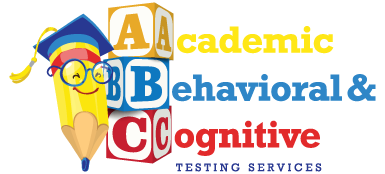Academic Testing
Get StartedAcademic Testing
Academic testing plays a vital role in assessing a child’s proficiency in reading, writing, mathematics, and processing skills. These evaluations help identify specific strengths and weaknesses, which is crucial for understanding potential learning disorders. For instance, phonological processing disorders can affect a child’s ability to recognize and manipulate sounds, impacting reading fluency and writing expression. Similarly, math disorders can hinder problem-solving skills. Early identification through academic testing enables the implementation of targeted interventions, supporting children in overcoming these challenges and achieving academic success.
A psychoeducational evaluation from ABC Testing Services, may include testing in the following areas:
Academic Evaluation
Cognitive
Processing
Visual-Motor Integration
When preparing for your child’s evaluation, it’s important to consider the administration time, which typically ranges from 1-2 hours and can vary based on the individual. ABC Testing Services suggests selecting a time when your child is most alert, ensuring they are well-rested, have eaten a balanced meal, and are in good health. Additionally, it’s beneficial to encourage your child to do their best without placing undue pressure on the test session itself.
Phonological Processing
Phonological processing is the ability to discern basic units of sound and apply grapheme-phoneme relations when reading and speaking. A student who presents with difficulties in this area may have limited sound-to-symbol skills, may take longer or be unable to recognize sounds, may have limited ability to identify parts of words, may make errors in speech and/or written language, and may not be able to remember things that are presented orally. A deficit in one or more of these types of phonological processing abilities is viewed as the most common cause of learning disabilities in general, and of reading disabilities in particular. Moreover, the awareness of phonological structure of language is necessary for basic reading, reading comprehension, spelling, and written expression and is the single-best indicator of early literacy and reading performance.
Reading Disorders
Reading disorders, also known as dyslexia, involve challenges with various aspects of the reading process, including fluency, accuracy, rate, and comprehension. These difficulties often emerge early in a child’s academic journey and stem from challenges in understanding and using spoken language. Children with reading disorders may face issues such as:
- Struggling to recognize both basic and complex words.
- Experiencing difficulty with spelling.
- Encountering challenges with handwriting.
- Having trouble reading with appropriate expression and intonation.
- Finding it hard to understand written text.
It’s important to note that reading disorders are not indicative of intellectual or developmental disabilities, nor do they reflect a lack of intelligence or unwillingness to learn. Early identification and targeted interventions can significantly support children in overcoming these challenges and achieving academic success.
Written Expression Disorders
Written expression disorders are identified by writing skills that significantly lag behind what is expected for a child’s age, intelligence, and educational background. These deficits can impact academic performance and daily activities that require writing. Common challenges include difficulties with grammar, spelling, and mechanics, as well as a limited ability to construct coherent sentences. Addressing these issues early on is crucial for improving academic outcomes and enhancing overall communication skills.
Math Disorders
Math disorders occur when a child has deficits in basic math skills, number concepts, math calculation, and word problem solving. Children with difficulties in this area cannot grasp basic concepts even when they put forth maximum effort and memorize basic math facts. They may also have trouble in the following areas:
- Recognizing numbers and symbols
- Identifying signs and their meanings
- Learning and recalling basic math facts
- Writing numerals clearly
- Applying math concepts to everyday situations
- Finding different approaches to solve the same math problem
- Understanding math rules and procedures
- Having a poor sense of direction
F.A.Q.
What ages do you evaluate?
We assess individuals of all ages, from infancy to adulthood (0–99).
My child has never been seen by a psychologist, can they still be evaluated?
Yes! Your child does not need a prior psychological evaluation to be assessed. Our comprehensive evaluations are conducted in-office, providing a thorough understanding of their academic, behavioral, and cognitive needs.
Can the evaluation be done virtually?
We conduct most Comprehensive Diagnostic Evaluations (CDEs) virtually, but in-person evaluations are also available.
What is a CDE?
During the Comprehensive Diagnostic Evaluation, a Licensed Psychologist will evaluate various aspects of your child’s development and functioning, including communication, social abilities, behavioral strengths, and developmental background.
What is an ADOS-2
The ADOS-2 (Autism Diagnostic Observation Schedule, Second Edition) is a semi-structured, standardized tool that uses various play-based activities to assess communication, social interactions, and restricted or repetitive behaviors associated with an ASD diagnosis. It provides a reliable method for evaluating and diagnosing autism spectrum disorder across different ages, developmental levels, and language abilities. Recognized as the gold standard in autism assessments, the ADOS-2 is widely used for its accuracy.
What should I bring on the day of my child's full evaluation?
Ensure your child gets a good night's sleep, eats a well-balanced breakfast, and, if possible, arrange for siblings to stay at home.
What documents are required to schedule my child's evaluation?
You will need a valid ID or driver's license, insurance card, prescription, and any relevant diagnosis documentation.
Is a referral required?
Yes, a referral is required for Medicaid plans.
Do you offer counseling services?
Yes! You can access therpay services through our sister company, ABC Therapy Services.
